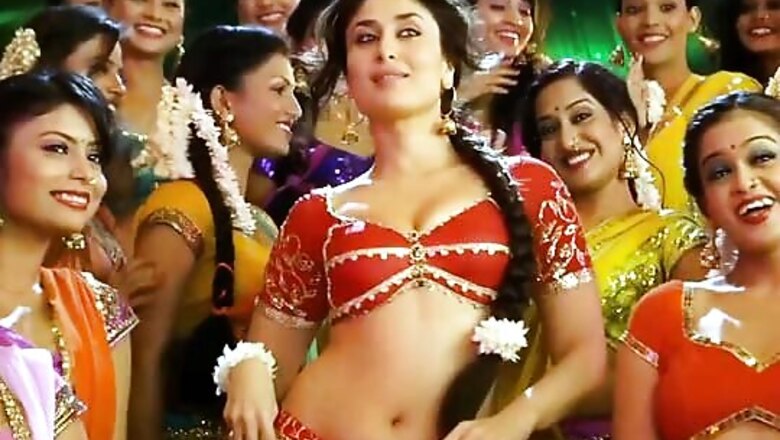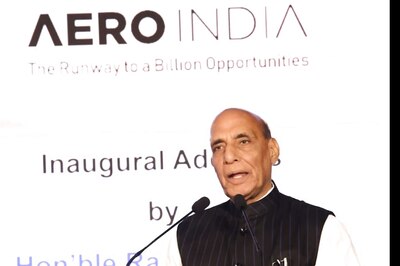
views
New Delhi: The death of a young girl in a brutal gangrape in Delhi has not only sparked nationwide protests against the lack of safety and dignity of women in this country, but has also prompted a welcome introspection on the role popular culture plays in shaping society. Many actors and directors have spoken about the objectification of women in mainstream cinema and the debate has spilled over on to the social media websites.
At the very onset, let's clarify that it will be highly presumptuous to assume that Hindi cinema is the root cause of a spike in sexual assaults. But Bollywood and regional cinema in equal parts, because of their reach, scope and influence, have a larger role to play in assuming responsibility for the message it sends out to millions of audience - some highly impressionable.
Films are not only a reflection of the society but also a powerful tool that shapes social engagement, culture and behaviour. For millions in India, Bollywood movies are about escapism from the struggle that surround their daily lives. And in a rapidly modernising India, where women have started to break free from their traditional shackles, regressive themes in films that include subjugation of women provide men with moral reinforcement to perpetuate gender stereotypes and sanction acts of domestic violence.
A Tamil filmmaker recently defended his film that was widely criticized as insulting to women. In an interview with IBNLive, writer and director Vignesh Shivan said Poda Podi, that starred Simbu and Varalaxmi in the lead roles, reflected what is happening in society. In a nutshell, the film portrays a man bringing his wife's dancing career to a halt because the traditional husband in him realized that a woman's place is at her home, raising her children.
Cinema, the world over, has played a major role in educating, informing and entertaining a wide audience in areas where government outreach programmes have failed. In India, it is religion to some and capable of inciting passionate outbursts. Let me cite a recent example. In response to a critical observation of mine on a leading Bollywood star on Twitter, one of his fans responded in a way that transcended all limits of courtesy. In the process of defending his idol, he threatened and abused me publicly and wished this star "would run me over with his car."
The comment was condemned and appreciated in equal measure by other users and fans of the star. But it gives you an idea of the kind of involvement ordinary men and women have with cinema stars.
Music and Lyrics
The etymology is perhaps unclear but no other word commodifies women like the word 'item' does. A variant of it is perhaps 'maal' which roughly translates to property in English. Both have been used countless times in songs. When Govinda lip synched to 'Main toh ladki ghuma raha tha' to Kumar Sanu's hit number in the 1995 film Coolie No. 1, it started a rage of songs with unsubtle allusion to women as objects to be flaunted and 'taken around'. Director David Dhawan set out to make a series of similar films that thrived on slapstick and innuendos. Salman Khan and Sanjay Dutt systematically bullied a cowering Karisma Kapoor in 'Chal Mere Bhai'.
Filmmakers, actors and writers have themselves often rued the decline of good lyrics in songs. Javed Akhtar, in his almost four decades in the film industry, has been the most vocal, often critiquing the cult culture of modern songs. At the time of the release of the massively popular Kolaveri song, he said "Every one is praising the robes but the emperor is naked. Tune ordinary, singing sub-standard, words an insult to sensibility." National award winning filmmaker Onir commented on Twitter recently "Popular entertainment has to stop portraying sexual harassment as a cute boy thingy".
Film writer Mushtaq Shiekh said: Bollywood creates an artificial construct of a woman. We should take an oath to make the change.
A line from the Fevicol song of Salman Khan's recent release 'Dabangg 2' had a women likening herself to a piece of tandoori chicken to be washed down with alcohol. The actual lyrics are "Main toh tandoori murgi hoon yaar, gatkale saiyaan alcohol se". In Ajay Devgn's Son of Sardaar, released this year, the Po Po Po song has a line "Tu hai mind blowing maal, aaja nach le". Both songs are hugely popular even sung by children without perhaps knowing the full implication of the words.
There was a scene in '3 Idiots' that made a joke of the word balatkar (rape) in pun play. It brought the house down in theatres, but have you thought how much it diluted the implication of rape? I doubt if it was as funny to women who have been victims of rape. There is a thin line between creative freedom and misogyny and it is up to the talented men and women of our film industry to figure out where to draw that line.
You can ask critics to lighten up and insist your right to crack sexist jokes is part of your freedom of expression, but it does not change the fact that a medium of massive reach, cinema has to own up to its role.
Who is responsible for this trend?
There are two factors to consider - the business side of cinema and the stiff competition in the industry among stars themselves. In business-driven big budget films that have crores riding on their success, Bollywood's leading women choose to play any part that is offered to them - given the success rate of such cinema. Often they are no more than props supporting the main protagonist, with very few independent scenes - case in point 'Dabangg 2', an out and out Salman Khan film.
Secondly, women in Hindi films have a much shorter career than their male counterparts. While Aamir Khan, Shah Rukh Khan and Salman, all in their late 40s, enjoy a wide fan following and regularly play the lead in films - sometimes even a college student - women who started out with them have moved on to second leads and insignificant character roles. Given the stiff competition, it is imperative that women play as many roles partnering big stars as they can get - what choice do they have? Alia Bhatt recently debuted at the age of 19 while most of the established stars are already in their early and mid 30s.
Why blame Dabangg, cinema has always endorsed stalking, assuming that is what the woman wants but is too coy to state it. Shammi Kapoor followed Sharmila Tagore on a ropeway in An Evening in Paris in the song 'akele akele kahan jaa rahi ho' refusing to take her hints to leave her alone. Over time, the clearly derogatory term 'ladki patana' became almost a non-offensive substitute for wooing women at colleges and schools.
Conform to norms or lose out
It is heartbreaking how women are clubbed into submission, with the threat of eternal loneliness if they do not conform in mainstream cinema. In Cocktail, released this year, the male protagonist is shown picking the demure, traditional heroine over the free spirited, wild thing, living her life on her own terms. In Agent Vinod, the woman is sacrificed while the hero moves on. In Jannat 2, a woman is the pawn between two men. In Hate Story, the woman scorned not only becomes a sex worker but in a grisly scene with the potential to put off women from reproduction, is shown being forced to abort her foetus.
Films are influenced by society
If you accept the common argument that Bollywood is a mirror of society, you have to also admit that society imbibes a lot from films as well. Men and women pour out in droves when a popular star dies, they vent their anger if they are criticized and they stand in front of their houses for hours for a glimpse on their birthdays and they copy the fashion and the popular punch lines. It became a fashion for people to name their newborn Raj, Prem or Rahul, after the characters their matinee idols played in hit films.
Yes, a drunkard on screen won't influence the masses to take to drinking or a murderer will not inspire killing, but in a society where women are already treated as unequal to men and misogyny is deeply embedded in people's psyche, filmmakers have an added responsibility of how they portray women. Why imbibe the worst of society? Even business-wise, films such as Vicky Donor, Kahaani and Barfi have proved that audiences have a taste for subjects other than the regressive drivel some filmmakers force feed the audience. Their success story should inspire others wishing to make sensible cinema.
Walk the talk
Member of Parliament Jaya Bachchan broke down on national television speaking about the gangrape victim and asked for forgiveness from her countrymen in a rare display of honest emotion from a politician and film star. Shah Rukh said he was ashamed of being a man. It's all well, but Bachchan exercised a choice when she decided to play the subdued wife of a patriarch in 'Kabhi Khushi Kabhie Gham', establishing every gender stereotype in the book.
Of course stars have a choice
The worst on screen abuse of women are usually in multi-starrers that thrive on regressive plots victimizing a pliant and easily subdued woman. The common argument is 'why blame the stars, they have to make a living'. I strongly object to that. The heroes of most of these films are established stars with no monetary compulsion to select a script that is clearly offensive to women.
They have a choice to say no, to pass it up. The monetary compulsion should not be so overwhelming as to override their good judgment. But sadly, it does.
####




















Comments
0 comment